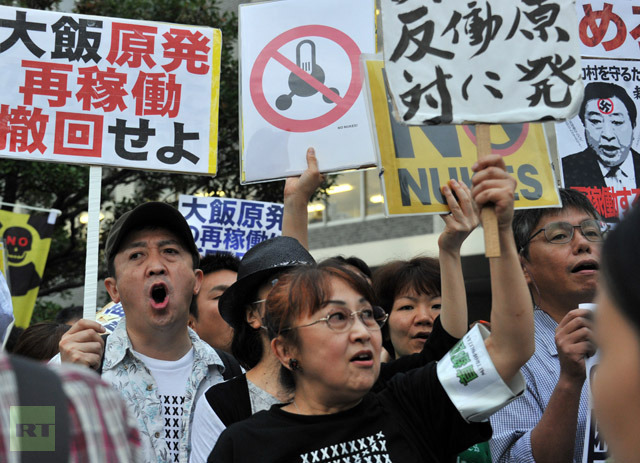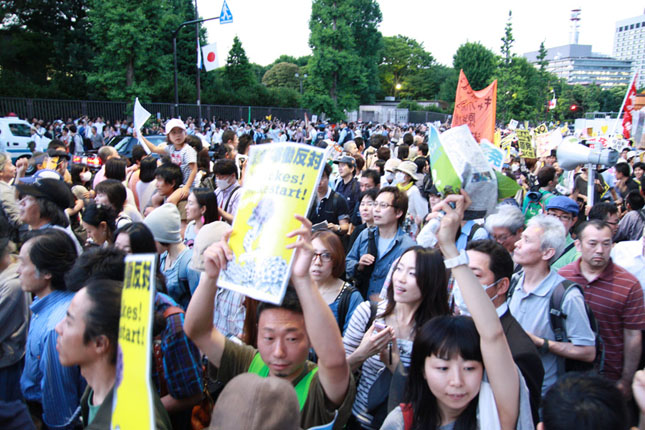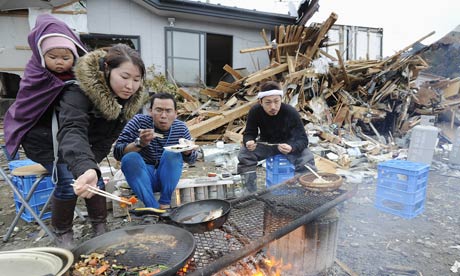
Thousands of demonstrate people have rallied in Tokyo demanding an end to nuclear power, the latest in a series of anti-atomic gatherings following the tsunami-sparked disaster at Fukushima.
Tens of thousands of people crowded into a park in central Tokyo to protest the use of nuclear power in Japan, highlighting the growing opposition to atomic energy in the country since the crisis at the Fukushima Daiichi power plant.
The peaceful demonstration took place on Japan’s national day in an area the size of a large sports field in Yoyogi Park, near the bustling shopping and nightlife district of Shibuya. The crowd chanted in chorus: ‘ Don’t resume nuclear power operation. Prime Minister Noda should quit. ‘
The organizers said 170,000 people had converged near Yoyogi Park (south-west of central Tokyo). It was one of the biggest anti-nuclear rallies since last year’s quake-tsunami sparked the world’s worst atomic disaster in a generation, beyond the 100,000 participants hoped they gather.
Tokyo Anti-Nuclear rally attracts thousands in growing protests / 16-months after Fukushima disaster
The event attracted so many people on a hot July public holiday that many spilled out into the surrounding streets, unable to enter the main area. It brought together a broad mix of Japanese people, from seasoned environmental activists to families who hadn’t participated in a protest before.

Participants included the prominent musician and composed Ryuichi Sakamoto and Nobel-winning author Kenzaburo Oe, addressed the demonstrators from a stage, calling for an end to nuclear power in Japan. Participants held banners echoing his statements and criticizing the government.
Japan’s Prime Minister Yoshihoko Noda angered nuclear opponents last month when he approved the restart of 2 reactors at Kansai Electric Power Co. Ohi plant, which were shutdown along with other units for safety checks after the meltdown and radiation release from the wrecked Fukushima station. Japanese newspaper has published that as many as 71 percent of Japanese were opposed the restart.
Japan’s largest anti-nuclear rally in Tokyo / 170,000 people attended the demonstration in Japan
Though no deaths have been attributed to the nuclear accident, the earthquake and tsunami killed more than 15,000 people in northeastern Japan. The damaged Fukushima spewed radiation, prompting the government to evacuate dozens of thousands of people.
The latest demonstration group came after a nuclear reactor in western Japan began full operations last week, the first restart since the country shut down its atomic stations in the wake of last year’s crisis.
One of the protesters has commented : ‘ There’s something wrong in this country when even if thousands of people protest in front of the prime minister’s residence they still reactivate the plants. We’ve developed an economy that is capable of sacrificing its own people; our goal is to change such a society. ‘
Yoyogi Park gathering attracted people from regions throughout Japan, including Fukushima. Beside some singing and drums, the thousands attending – mostly families and the elderly – were seated on the grass waving banners and listening to the speeches.
Tens of thousands demonstrate against nuclear power in Japan
Radiation fallout from the Fukushima reactors forced the evacuation of about 160,000 people and left land in the area uninhabitable for tens of years. The potential for a repeat of the disaster at another nuclear plant in earthquake-prone Japan is what is bringing Japanese old and young out on to the streets in large demonstrations not seen in decades.
Some children from Fukushima city fled to our town after the nuclear disaster and they experienced health problems, such as bleeding from the nose and blood in urine and they experiences has never been reported by the Japanese media, which ignored inconvenient facts.
A recent parliamentary report said the accident at the Fukushima Daiichi plant was a ‘ man-made disaster ‘, marked by a lack of oversight and collusion between plant operator Tokyo Electric Power, the government and regulators.
The 30-year-old protester said to the reporter : ‘ One person alone can’t do much but 100,000 people can make a difference. I’m here today to be one of the 100,000 ‘.



LK, the truth is, PV cells are used everywhere. It’s nosnense that they are not commercially viable today. Take a walk down the lighting aisle at Home Depot is you don’t believe me. It’s completely practical and efficient; not to mention cost-effective (no electrician needed).Now, perhaps by commercially viable, you mean, on an industrial scale. It’s true: that’s where the equation falls down. For now. But where would the oil industry be without billions in government subsidies? Let’s put those dollars to work toward an industry could and will offer high-paying technology jobs and enhance our environment and security (by lowering our dependence on oil).